So, I got called a "honky" today
I advised civil rights advocates not to use obscure acronyms and abbreviations UNLESS you also explain their meaning. That got me labeled a racist. Why is good messaging so anathema to the Left?
I waded into a little Twitter storm last night that, sadly, tells us a lot about why the Left is so bad at messaging.
I advised people not to use obscure acronyms and abbreviations — and to most Americans, they ARE obscure — UNLESS you also explain what they mean. Otherwise, much of your audience won’t know what you’re talking about. Specifically, I was responding to this tweet by HuffPost’s Philip Lewis — a great guy, whom I’ve followed for years — about a series of bomb threats at historically Black colleges and universities, or HBCUs.
I’d never even heard of the term HBCU until a few years ago. (That got Twitter really mad. I always enjoy when people expect you to know things you’ve never heard before.) And I guarantee that a lot of people on Twitter have no idea what HBCU even means, and thus, wouldn’t learn anything from the tweet — they wouldn’t even realize that we’re talking about hate crimes/terrorist threats against Black colleges. So they wouldn’t even know it’s a civil rights issue and a hate crime. Far too many people would read the tweet and move on, not ever knowing that this was about some pretty horrendous (ongoing) racism.
I’ve raised the same concerns about abbreviations and acronyms like AAPI (Asian-American and Pacific Islander), BIPOC (Black, Indigenous and People of Color), and, as a gay man myself, LGBTQIA+. Each of these phrases are understood by only a small portion of the population, so when we use them writ-large, without explaining them, most people have no idea what we’re talking about. As an aside, the folks on Twitter also lectured me that “everyone knows what BIPOC means.”
And this is indicative of the problem. A lot of these people live inside their own self-reinforcing social media bubble. The notion that everyone knows what HBCU, AAPI and BIPOC means is patently ludicrous.
To wit, I was looking for information a few months back on hate crimes against Asian-Americans, as I wanted to write a piece to help elevate the issue, and landed on a page devoted to “AAPI Hate” — that’s all it said on the home page. Nothing about Asian-Americans, nothing about Pacific Islanders. Just AAPI. You’d have no idea who the page was about had you not googled the term AAPI. The organization simply assumed you were familiar with it. (I only learned THAT term last year!) Same problem with BIPOC. I remember reading an African-American guy I follow on Twitter saying that he thought it meant “bisexual people of color.” As for the ever-growing abbreviation for gay, bisexual and trans people, it’s gotten so long that most people have no idea what every letter means. (Ask most Americans what the Q stands for, let alone the +. As an aside, one of the Twitter scolds just informed me that it’s actually three pluses now, LGBTQIA+++. No idea why.)
When you use these terms without explaining them, you “in” your argument, making it so obscure that no one knows what you’re talking about.
Oh, the gnashing of teeth I received in response to my simple suggestion that we try to explain civil rights issues in a manner in which most people will understand. Here’s a sampling of the replies. (I must add that Philip isn’t even a party to this dispute. It was everyone else online who went nuts in response.)
Just to remind you, this all started because I tried to help African-American civil rights advocates, and allies, better reach white audiences by simply suggesting that they explain acronyms that most people aren’t familiar with.
As an aside, many of the folks are noting with gotcha-consternation that I use abbreviations in my Twitter profile, so I’m a hypocrite! Uh, no. I never use obscure abbreviations when advocating for an issue. A Twitter profile is not an appeal to the public to agree with me on an issue. Were I writing a resume, I’d note that I’ve worked at the Children’s Defense Fund, not CDF. When you are advocating for a cause to the general public, you simply should not use language that they are unlikely to understand, especially when the language is key to your entire point (they won’t even know what community or cause you’re advocating on behalf of!)
Now, there’s a lot going on here. We’re all angry and on edge after the last four years of Trump, and the ongoing effort to dismantle our democracy and destroy every issue we care about. That tandems with the purity politics/cancel culture issue (a phrase Republicans like to use incorrectly — they call everything cancel culture — but it is a real thing on the fringes of the left, and among most of the right). People are looking for villains everywhere, and they all too often turn their suspicion and their ire towards allies, of whom, it seems, they have a longstanding distrust. If you’re not 100% in agreement with them on every issue, they pounce — and no good work you’ve done before, or will do since, matters.
There’s also the issue of Democrats simply not being very good at messaging. So my basic point, that should be obvious, that you shouldn’t use terminology that most of your audience doesn’t understand, unless you explain it, is lost on people who simply don’t know how to message anyway.
And finally, there’s another problem that I’ve found all too often among younger lefties: They want their victories handed to them — they think it’s offensive to have to fight for their rights. Now, in a way they’re not wrong. I’ve been a civil rights activist for going on 30 years now. And it’s offensive as hell that I have to fight for my civil rights. I should just have them. Everybody should. But that’s my lot in life. Gay, bi and trans people are still discriminated against, and I can either sit back and bemoan that fact, or I can do something about it. I chose the latter thirty years ago. And part of “doing” is explaining. It’s educating. It’s answering their stupid, but well-meaning, questions, and ultimately winning people over. And that concept — the notion that the burden is on you to inform the uninformed — is offensive to many younger lefties. I take you back to this tweet:
“Hold white folks hands.” Yes, you should, the same way I’ve held straight people’s hands for 30 years now. It’s my job as a civil rights activist, and more generally, as someone who has devoted his life to making change — and should be the job of every decent human being — to educate others about the discrimination people face. Absofuckingposilutely. I first saw this “it’s offensive to ask me to advocate” argument among some younger trans activists a few years back. I had written some blog post that many of them were offended by, because I said in the post that it’s their job to explain their issues to people who don’t yet get it, including their prefered terminology, in the same way it’s my job to do the same as a gay person. The typical response I got was that it was offensive to ask trans people to take the lead on educating others: Non-trans people should take the initiative and educate themselves. Which is a beautiful thought. Except, most won’t. That’s the entire reason we fight for our civil rights, because most people don’t get better, don’t get more informed, don’t get more tolerant, on their own. They need to see and hear and witness things around them in order to slowly change their minds. And if we don’t do it, it won’t happen.
It is our job as people who care about civil rights — and as progressives, more generally — to educate people about our issues in the most effective way possible. And that means using the most effective language possible. It’s not a particularly radical proposition. It’s simply a question of whether you’re here to win, or whine. And I want to win.
Then there’s the notion that people should “google it” if they don’t understand your message. Sure they should. But most won’t. If you read a tweet that you don’t understand, most people aren’t going to google it. They’ll just move on. That’s the kind of society we live in now. Everything happens in the now, and you’re only as good as your last viral tweet. If people don’t understand what you’re tweeting about, they’ll just scroll to the next tweet they do understand. Is that a good thing? No! They should pick up their lazy ass and Google it. But most won’t. So you have a choice. Think about it. There’s a hugely-important piece of civil rights legislation you want passed, and you stand up to give a speech intended to convince people to support it. But because you think it’s offensive to actually explain the problem — and let’s be honest, if people cared, they’d already be up on the issue anyway — so you get up on stage, chastise the audience, and tell people to google the issue for themselves. How many votes did you just win over? And how many did you lose?
If many people aren’t understanding what you wrote, what is so difficult about rewriting it in a way they can understand? What is so hard and controversial — and even offensive — about that simple proposition? You should always communicate to be understood. It’s axiomatic. It’s writing 101. Marketing 101. And Activism 101. Otherwise, why are you communicating at all if you think it’s everyone else’s burden to learn the issue for themselves? (And again, they won’t. So what’s the alternative? That you educate them.)
And more generally, why the venom (and particularly, the racist venom), over a white guy trying to offer advice as to how best to reach white people? Isn’t that what we want more white people doing — caring about these issues enough to step up and try to find ways to communicate them to more people?
Now, some of this is Twitter, and the Internet more generally. Everybody, from genius to crackpot, now has an equal voice. You don’t have to be right, or even informed, in order to blast your opinion to the masses and create a storm of ire against your latest perceived enemy. This is the topic of another story for another day, but as much as I’m an advocate of the Internet, it’s empowered far too many people who lack the expertise to be good advocates. And their muddy thinking muddies our message.
At the end of the day, this honky will continue to help African-Americans sell the civil rights message to white audiences, whether struggle-twitter likes it or not. I’m in this to win, and ultimately help people — not to be loved.
To paraphrase Harry Truman’s apocryphal wisdom, if you’re looking for love, get a dog. I did.
JOHN






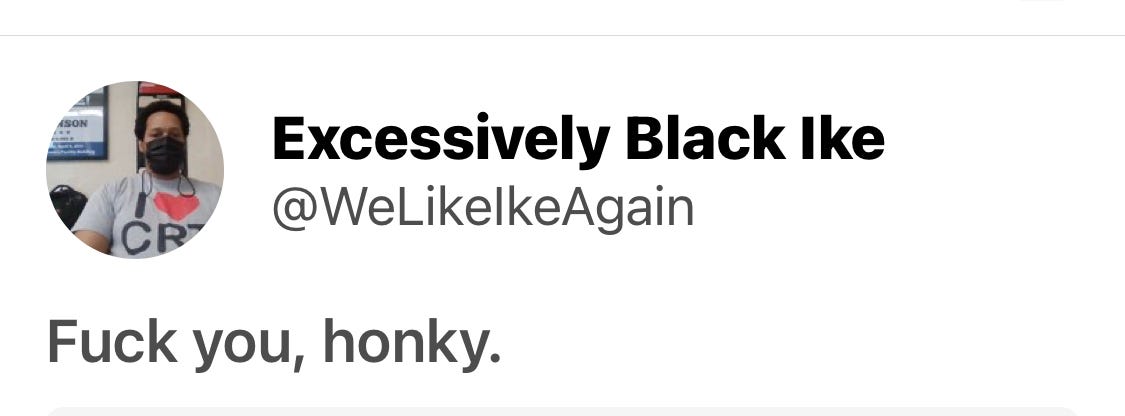
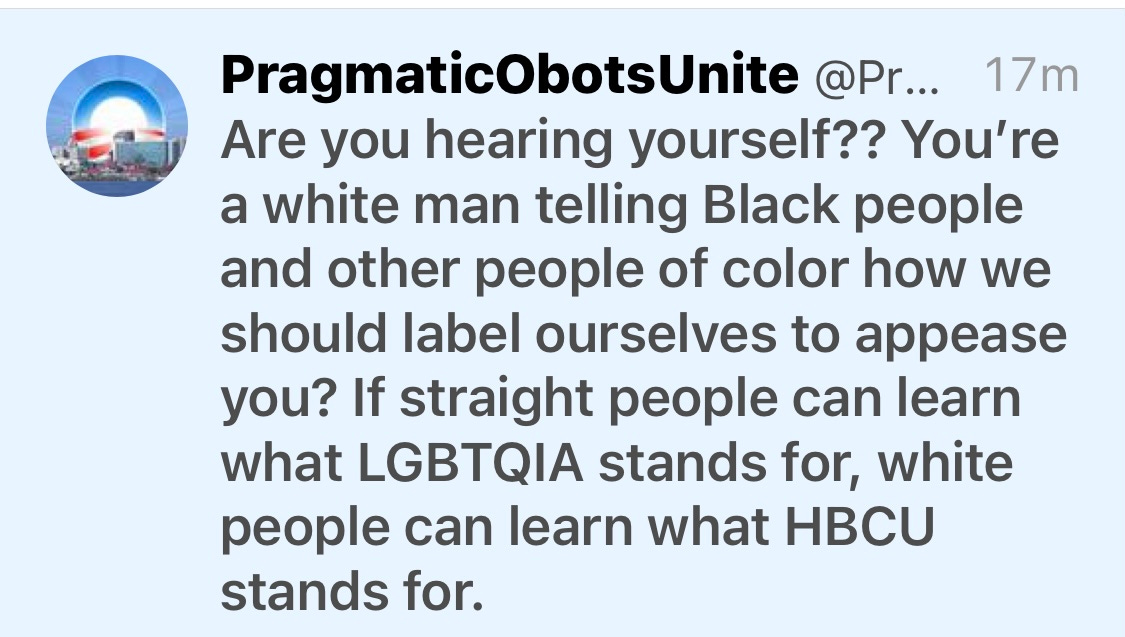


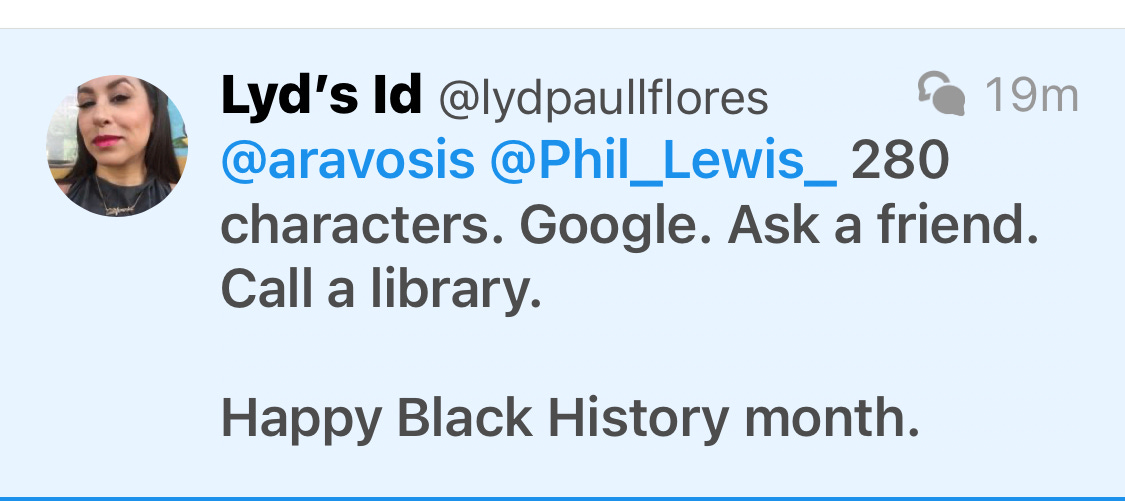
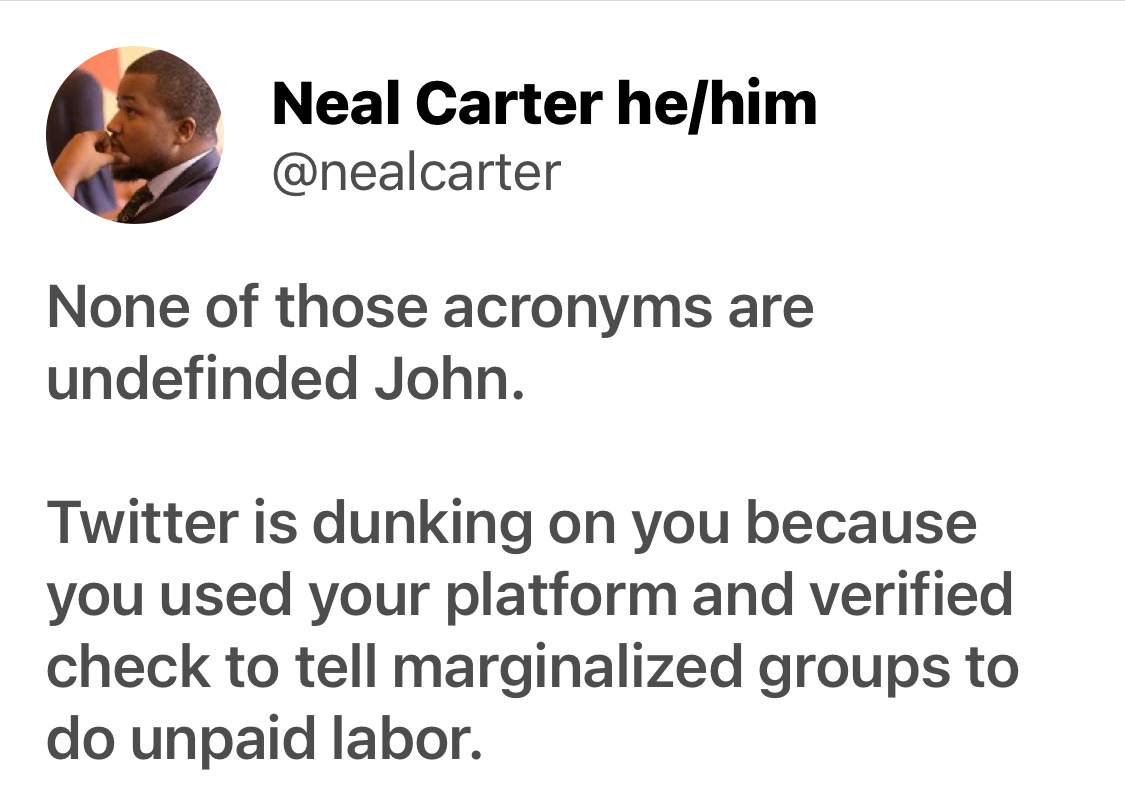
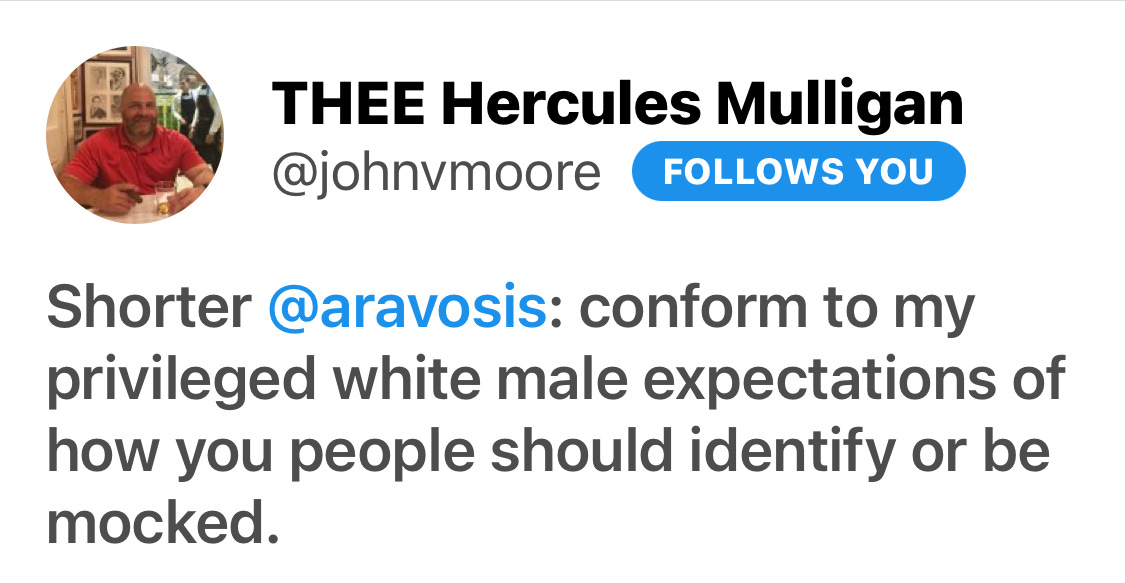
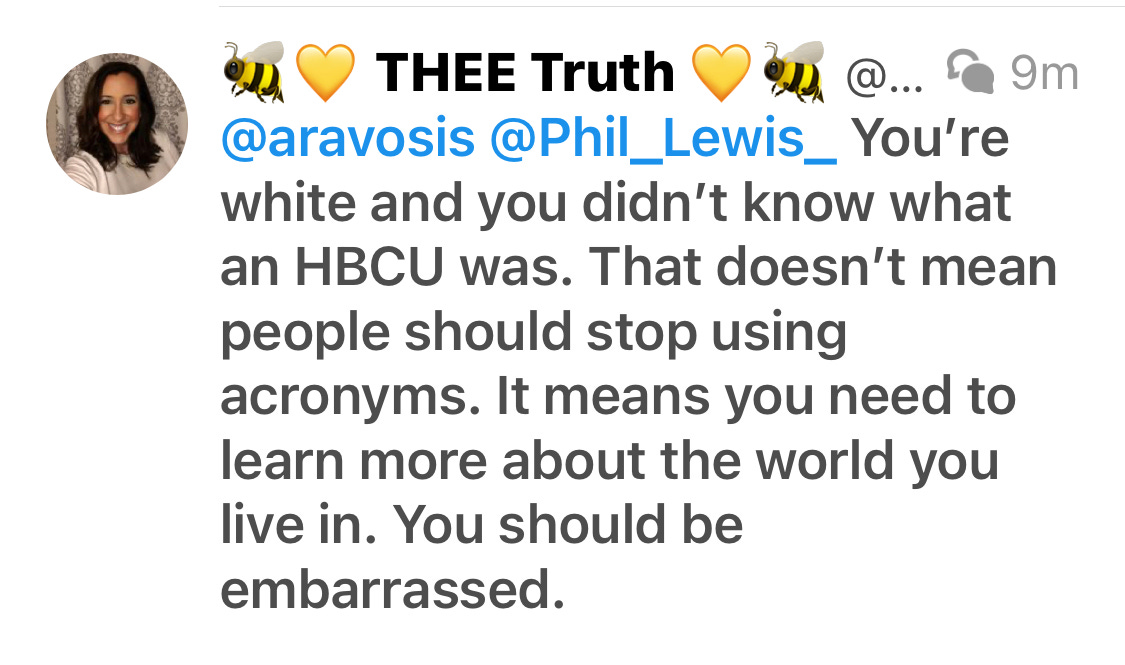
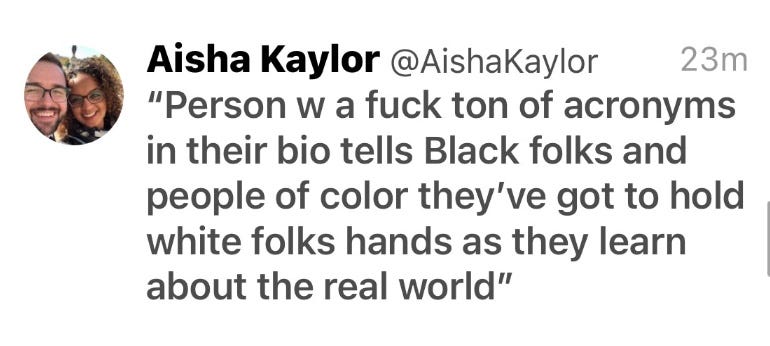


I understand and agree with what you wrote. As an old white guy that thought we had won these same battles back in the 60s and 70s, I too am angry that we still MUST fight to win. Acronyms can help and hurt a cause, just as you pointed out. Many people my age, even if reading Twitter, may Google terms they do not understand. However, it was only last night watching Jonathan VanNess’ Netflix show I truly understood “non-binary”. Is that the + you are talking about? The only way we can win is to quit getting our fucking feelings hurt and EXPLAIN to allies WTF people are talking about. Thank you for laying this out so clearly.
Yes, yes, yes! Explain every time you use an acronym.